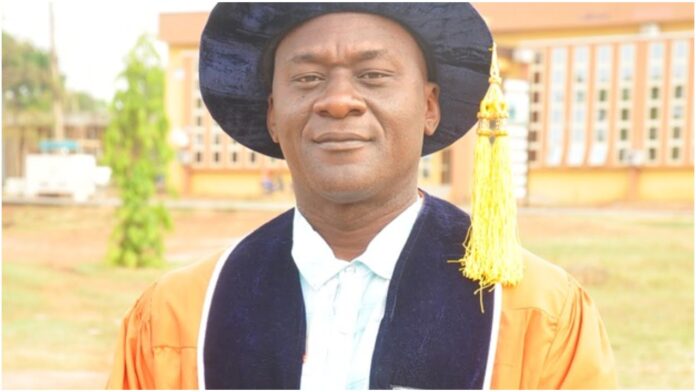Re: “Between growing SMEs and our collective security”, by Dr Adoyi Onoja
Let me begin with a confession. I have not read nor do I intend to read the budget speech that contained the statement of intention of the federal government on the small and medium-sized enterprises (SMEs) development in Nigeria.
I read the critical yet balanced editorial by Mr Mohammed Kudu Ibrahim titled “between growing SMEs and our collective security”. As I noted privately to him and which prompted his request for me to write on this, I agreed with the substance of most of his contribution except the part on security and collective security.
READ ALSO: Apollo 12: Marking 60 years of man’s terrestrial romance with space, by Prof. MK Othman
My intervention, in this piece, comes in two folds. The first part is on his editorial – the part I did not agree with. The second part is to draw attention to the immense contradictions and often gaslighting that is replete in the pronouncements and statements of intention of this federal government.
My reservation is with the concept of collective security without first looking at security. For me, security birthed collective security since, without the understanding of security, the concept of collective security will not be clear. Security is thus the independent variable and collective security the dependent variable.
Let us assume the editorial’s conception of security is the noun or name and verb or work of the military, intelligence and law enforcement (MILE). For the MILE to be able to keep and maintain public order, it is contingent on the conscious and conscientious pursuit of small and medium-sized enterprises development in the three tiers of governments which will create opportunities for persons in the short, medium and long term.
This development will create and emplace the enabling environment for the MILE security type to keep and maintain public order at a reasonable level. In other words, the MILE security framework cannot and will not work without the economic opportunity framework in place for most persons.
While this perspective underscored the role of governance or the effective and efficient utilisation of human and material resources for the benefit of most persons through the governance of the economy in creating and enabling the MILE security type, the editorial’s perspective seemingly turned this upside down to the extent that that which subsist in Nigeria today did not give room to unleashing economic opportunity in order to facilitate and enable the environment for the work of the MILE security type. While the SMEs development pursued by the editorial implied this environment, the editorial’s perspective gave and is giving pre-eminence to the MILE as security and nothing else.
As I argued in my work, there are three routes to creating and attaining security in Nigeria. They are security route to security, governance route to security and law and order route to security. Security route to security implied agreeing and constructing security and security’s constituents and pursuing this in policies and programmes in order to attain security. Governance route to security means utilising effectively and efficiently human and material resources in order to deliver benefits to most persons so as to secure them. The first two routes should be tried prior to trying the third route. Law and order route to security is relying on and/or prioritising the military, intelligence and law enforcement to secure persons.
The third route is the last option assuming the first two routes failed. Nigeria has not exhausted the potentials of the first two routes prior to settling down with the last route which failed and continues to fail. There is an abiding faith in the law and order route to security in spite of its successful failure, especially in the last 22 years.
Unless we build and/or create and imbue security with ideas that represent our collective experience and aspiration to address what is security, whose security, what is a security issue and how can security be achieved, we cannot talk about “security” being “collective.” As a social idea, we – most Nigerians – did not sit together and agree on security and its constituents to make it collective. As it is practised in Nigeria and as most Nigerians were socialised into understanding, there is one dimensional perspective on security as the name and work of the military, intelligence and law enforcement.
In the last 22 years, this perspective of security failed and is failing to require the need to construct the new framework of security in tandem with representative rule environment and yearnings behind the decision of the majority of Nigerians to drive the military out of power in 1999. What this means, for now, is that the questions, issues and ways of thinking considered most important, in the MILE security type in operation in Nigeria, are neither neutral nor natural but are to use Robert Cox perspective, always “for someone and for some purpose”.
In the manner the MILE security is understood and practised in Nigeria, its umbrella excludes most Nigerians and leaves them at the receiving end in spite of the whooping N10 trillion of their funds expended on this security in the last six years alone. Imagine how much of this amount went into the provisioning of logistics for the military, intelligence and law enforcement! Imagine how much of this amount went into the pockets of elected/appointed/career civil servants and the elite of the military, intelligence and law enforcement managing this security! Imagine this amount of money poured into the development of small and medium-sized enterprises all over Nigeria!
I argued that in a properly constructed security concept and in the context of Nigeria’s history, experience and reality (HER) and representative rule system, the small and medium-sized enterprises (SMEs), as the editorial noted, is at the heart of security or that which secure most if not all Nigerians, if security’s foundation is economics – availability and accessibility of production, distribution and consumption of goods and services.
Indeed as I noted in a critique of the federal government’s three-point agenda of salvaging Nigeria beginning in 2015, of securing Nigeria (MILE security), revamping the economy in order to create opportunity for youths and fighting a relentless war against corruption, revamping the economy in order to create opportunity for youths – not just youths but all or most Nigerians – trumped the other two policy platforms.
This is because the problem in the country is economic underdevelopment producing limited or no opportunity in all spheres. This paucity of economic development is enhanced by the obstacles deliberately created by the country’s operating framework, the 1999 Constitution which negates economic development. Therefore, and assuming that there is the right constitutional operating framework in place, the creation of economic opportunity not just for the youths but for all demographic groups will first minimise and/or reduce corruption and second minimise and/or reduce crises and conflicts in the polity.
Thus both corruption of the Transparency International type which includes the Buhari type that is limited to theft of public funds creates a crisis in the polity on the one and on the hand, the constitutional imbalance occasioned by the 1999 Constitution enhance the state of crisis already engendered by the lack of economic opportunity for most Nigerians. Collectively, these translate into “security” challenges that oil the political economy of the ruling class’s MILE security type. At the centre of this economic regeneration and rejuvenation, if properly conceptualised and executed, is the Small and Medium-Sized Enterprises (SMEs) development.
The primary need, therefore, is the need to first resolve what is security, whose security, what is a security issue and how security can be achieved in Nigeria. Security is not natural as it is seemingly assumed and thus unchangeable and as has been demonstrated in the dogmatic adherence to the failed and failing security in place. Security is a social idea. We can resolve this by constructing and/or creating security within these contexts – Nigeria’s history, experience and reality (HER), democracy or representative rule framework and the realisation that the MILE security failed and is failing. This is the beginning of the cultivation of collective security. Collective security, in this context, is security that most if not all Nigerians created and owned.
I noted the immense contradictions and gaslighting in the pronouncements and statements of this federal government. The content which Mr Ibrahim’s editorial put on the agenda derived from the 2022 budget. What is evidently the routine and ritual of passing of budget has had the National Assembly and the different states of the federation fulfilling this role for the fiscal year 2022. The budget statement is one among the many statements and pronouncements of this government. There is also the planned lifting of 100 million Nigerians from poverty in the next 10 years, the vision and the recently unveiled five-year national development plan.
Nigeria, one would recall, slipped into the position of the poverty capital of the world vacated by India in the last couple of years. This federal government’s plan to lift 100 million of its inhabitants out of poverty is for the future. This is in spite of the limited time it has left in office and the time tested convention of lack of continuity of policies by successive governments assuming the plan is policy-based. The government’s National Bureau of Statistics (NBS) has reeled out figures, areas and geopolitical regions bearing the scar of poverty in the last six years.
Of the policy pronouncements that include lifting 100 million Nigerians out of poverty, the Vision and the five-year national development plan, how is the SME strategy a feature of these policies? This is considering the role of the small and medium-sized enterprises in ramping up development in all sectors and particularly in the infrastructure deficits that permeate developing countries economies. In terms of the 2022 budget plan for the SMEs, what connects this with the other plans – lifting Nigerians out of poverty, the Vision and the five-year national development plan? How is the SME in the 2022 budget playing into the other policy pronouncements? What connects the 2022 budget on the SMEs plan with the five-year national development plan and the lifting of 100 million Nigerians out of poverty in ten years?
Specifically on the issue of the SMEs as it concerns the 2022 budget, how much coordination is there between the federal government, 36 states and the 774 council areas? Is the SME agenda that of the federal government alone? Retrospectively and in the context of this federal government’s three-point agenda with reference to revamping the economy in order to create opportunity for youths, what role has the SMEs played in the last six years? What role will the SMEs play in the remaining years of this federal government? Is the SMEs just manifesting on the budget plan for the first time in this federal government’s strategy to creating opportunity for youths? What strategies drove the planned creation of opportunity for the youths in the last six years? What is the faith of the resources voted for the SMEs with the approaching election years and the money guzzling appetite of elections in Nigeria?
How realistic and reflective of the needs of Nigerians are budget provisions for sectors at federal, state and council areas? Are budget pronouncements not serving as a platform for the political class to assign funds for easy siphoning? This is in the face of fraud in the system when it is remembered for instance that the Aso Rock Clinic got billions of naira much more than what was assigned for the entire teaching hospitals available to the rest of Nigerians and yet there was no syringe available there.
This was similar to my discovery when I participated in a research/survey in one of the Middle Belt states in the first eight years of representative rule, 1999 to 2007. I used budget statements for six years running to match delivery on the ground. There was little or no delivery on the ground. Yet the budget fund for different sectors kept increasing yearly.
There is no guarantee that the money for SMEs will reach their intended targets. What role do the disbursing agencies play in getting the fund across chime with the tales of innovators and innovations applying for funds from banks only for the innovations to be stolen and actualised in another part of the country?
There are plenty of loopholes in policies and institutions that the intended effects of the programme on SMEs will be minimal. Where is the place of infrastructures – roads, rails and electricity – in driving the SMEs? Where is the place of legislation in creating the enabling environment for the SMEs to work beyond the intention of the federal government? Where is the coordination with other arms of government? Is it part of policy direction with enabling legislation?
The nature, meaning and purpose of the philosophy of the SMEs is to secure as many persons as there are to secure. This is security or wellbeing in all its forms in its foundational economic sense. This is what is lacking in Nigeria. Does this government view the SMEs in this perspective to throw its weight behind pursuing this to its logical conclusion or as Mr Ibrahim’s editorial put it “walking the talk?”
The result on the ground, in the last six years, for one of this federal government’s three-point agenda – revamping the economy in order to create opportunity for youths – is a barometer to the government’s understanding of the economy and the place of the SMEs as the driver of “securing” or security for most Nigerians on the one hand and the fate of the SMEs in the remainder of its term in power on the other hand.
For most Nigerians and for the administration itself, to paraphrase Goethe, matters never ripen for the administration’s new epoch to warrant all tendencies’ objectivity in the beginning before they entered their era of decline and all tendencies became subjective.
This administration has been out of the queue for most Nigerians should one be looking at the queue in the rearview mirror.
Dr Adoyi Onoja is a Professor of African History at the Nasarawa State University, Keffi
Follow the Neptune Prime channel on WhatsApp:
Do you have breaking news, interview request, opinion, suggestion, or want your event covered? Email us at neptuneprime2233@gmail.com






This is apt and beautiful. More grace Prof.